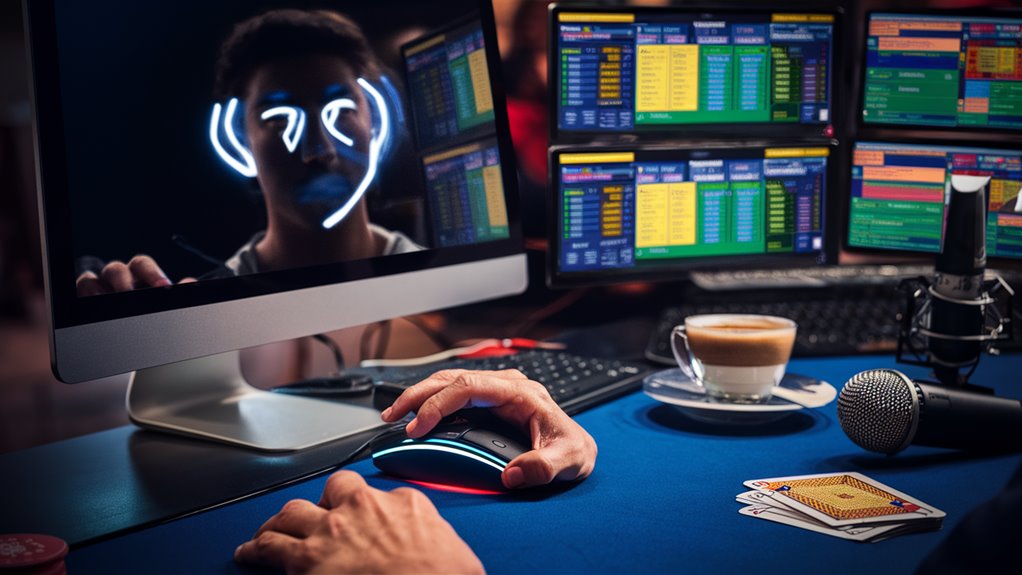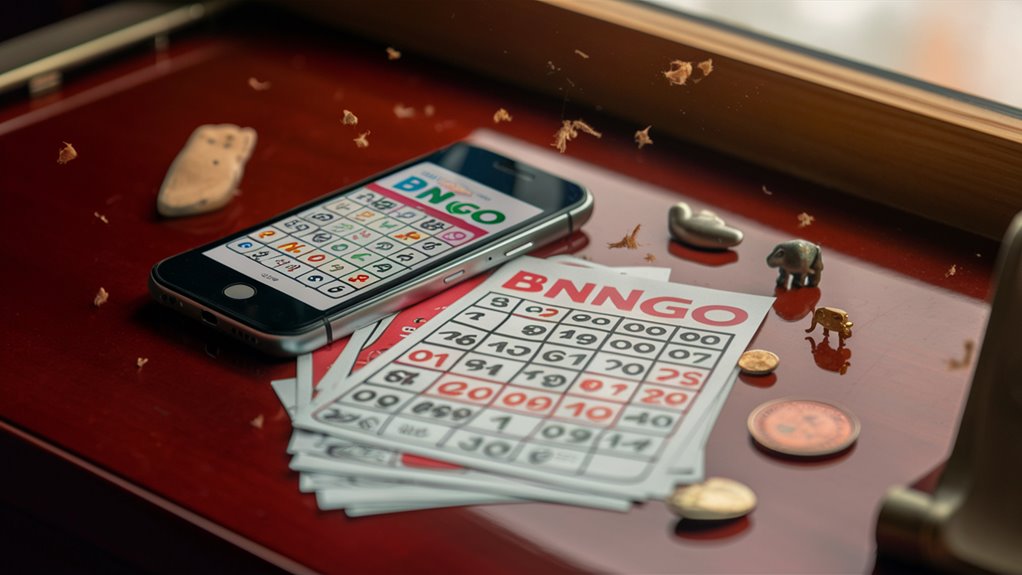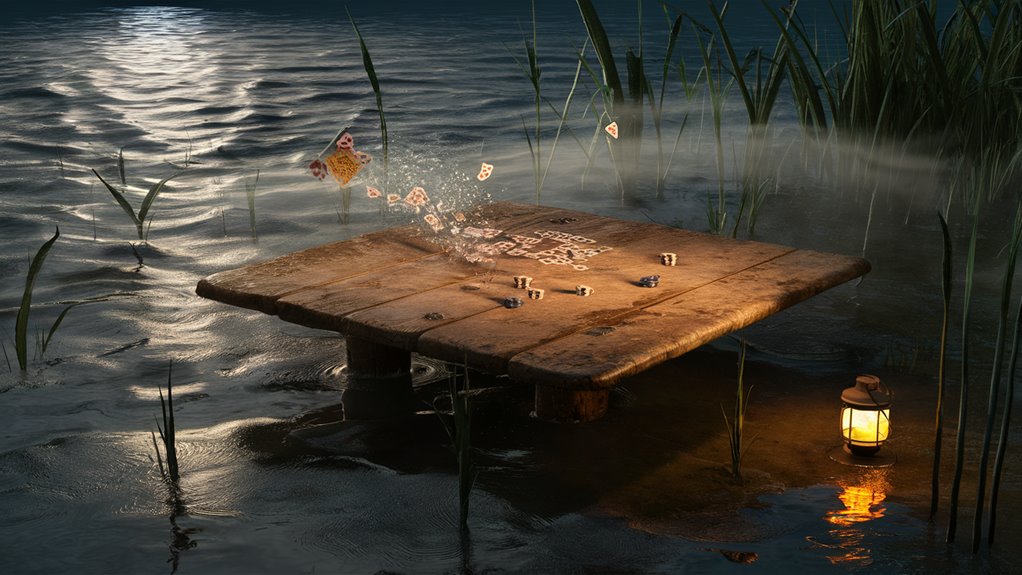Well, you won't believe how far online poker leagues have come since their early days. Remember those clunky text-based games from the 1990s? They've transformed into something that would blow the minds of those early IRC poker pioneers.
Let's be real here. What started as a few computer enthusiasts typing commands into basic chat rooms has exploded into this massive digital phenomenon. These days, you can jump into a high-stakes tournament while sitting in your pajamas, track every single stat you could imagine in real time, and compete for prizes that could literally change your life overnight.
But here's the really interesting part. The technology hasn't just made the games prettier or more convenient. It's completely changed who gets to be part of the poker world. Think about it. Back in the day, if you wanted to play serious poker, you had to live near a casino or know the right people. Now? Anyone with an internet connection and some skill can potentially become the next poker champion.
The interfaces are sleek, the algorithms are incredibly sophisticated, and the whole experience feels light-years ahead of those early days. You know what's fascinating, though? All this technological advancement hasn't just upgraded the game, it's democratized it completely. Whether you're a seasoned pro or a curious beginner, there's a place for you at these virtual tables.
The Early Days: 1990s
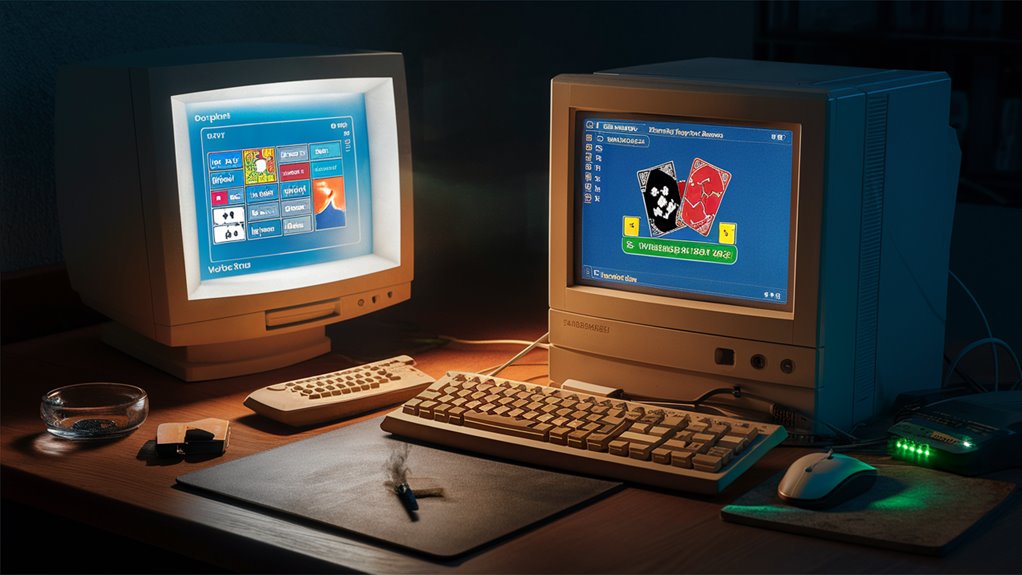
Let's dive into the wild early days of online poker. You know those massive poker tournaments we see today? Well, they actually started out pretty humbly in the 1990s, basically as chat games on IRC channels.
Picture this: poker enthusiasts huddled around their computers, typing commands to make their moves, and pretty much running on an honor system for betting with virtual chips. The first poker channel, #poker, became the go-to spot for players looking to test their skills without risking real money.
Things started getting interesting as the decade rolled on. You might think modern poker sites are complex, but back then, getting actual software interfaces was a huge deal. Planet Poker broke new ground in 1998 as the first real-money poker site, with Paradise Poker jumping in the following year.
Finally, players could see actual cards and chips on their screens instead of just text commands.
Looking at today's sophisticated poker leagues, it's hard to believe how basic things were back then. But these pioneering sites laid down some pretty important foundations.
They introduced simple ranking systems and tournament structures that would later evolve into what we know today. Think of it as poker's digital baby steps: basic leaderboards let players track their progress, while scheduled tournaments started bringing some much-needed structure to online competition. It wasn't fancy, but it sure was revolutionary for its time.
Rise of Virtual Poker Communities

Let's talk about how virtual poker communities changed everything back in the early 2000s. You know that feeling when you discover something that completely transforms your hobby? Well, that's exactly what happened around 2000-2003, when casual poker players found themselves drawn into vibrant online communities like Paradise Poker and PartyPoker.
Picture this: players from all corners of the world connecting, swapping stories about their biggest hands, and building real friendships despite never meeting in person. The best part? You could learn from seasoned pros without burning through your bankroll. Pretty neat, right?
Then came the game-changing forums like Two Plus Two and PocketFives. These weren't just ordinary message boards, they became the go-to places for anyone serious about improving their game.
Think of them as poker universities where you could dive into strategy guides, analyze tournament results, and jump into heated discussions about the perfect play. What made it even better? These sites often teamed up with poker rooms to give their members special perks and exclusive tournaments.
But here's where it gets really interesting. Virtual poker leagues started popping up, creating something that felt just like a regular poker night at your friend's house, except it was online.
You'd see the same faces week after week, build some friendly rivalries, and work your way up the rankings. The league organizers got pretty sophisticated too, rolling out detailed statistical tracking so you could see exactly how you stacked up against the competition.
Looking back, these leagues really laid the groundwork for what would eventually become today's professional online poker world.
Technology Behind Modern Leagues

Let's dive into the fascinating world of modern poker league technology. You might be amazed at how far we've come from the early days of virtual poker.
These days, the software running our favorite poker platforms is incredibly sophisticated, complete with real-time analysis of every hand and the ability to juggle multiple tables at once. Think of it as having a virtual poker assistant who never misses a beat.
The security features are pretty remarkable too. The systems work hard behind the scenes to catch any sneaky players trying to team up or use automated bots.
And here's something cool: every hand is truly random, thanks to special number generators that get thoroughly tested by independent labs. It's like having a virtual dealer you can absolutely trust.
Want to know what makes today's poker software really convenient? Well, it uses the latest web technology (HTML5 and WebSocket, if you're curious about the tech stuff) that lets you jump into a game from pretty much any device.
No need to download clunky programs anymore. The graphics are smooth, you can customize your setup just how you like it, and chatting with other players feels natural and fun.
Behind the scenes, these platforms are absolute workhorses. They can handle thousands of players at once without breaking a sweat, thanks to some clever server setups.
And talk about features, you get access to all sorts of stats about your game. Ever wondered about your win rate over time? Or wanted to study how certain players tend to bet? It's all there at your fingertips.
The software handles all the complex stuff automatically, from calculating pot odds to managing multiple side pots. There's even smart AI watching for any suspicious behavior.
Plus, when it comes to money matters, these platforms have got you covered with super-secure payment systems that work with pretty much any currency or payment method you can think of.
And if tournaments are your thing, the system manages everything smoothly, from satellite qualifiers to those exciting progressive knockout events.
Professional Gaming Takes Center Stage

Well, you might be surprised how professional poker has completely changed the game from casual card nights to a massive spectator sport. It's pretty incredible, really.
These days, the top players aren't just chasing prize money. They're building their own brands through Twitch streams, Instagram posts, and all sorts of sponsored content.
Have you ever watched a professional online poker broadcast? They've borrowed some clever tricks from traditional sports coverage.
You'll spot all kinds of cool features, like detailed player stats, probability breakdowns, and expert commentators who walk you through the strategy behind each move. Plus, thanks to hole-card cameras and live analytics, you can actually see the game from multiple angles, just like you're sitting at the table yourself.
Want to follow the action? These days it's easier than ever. The biggest tournaments run regularly with prize pools that'll make your head spin, often reaching millions of dollars.
League standings keep track of who's hot and who's not across multiple events, creating exciting storylines throughout the season. And here's the best part: if you're thinking about going pro yourself, most leagues offer qualifying tournaments where amateurs can work their way up to the big leagues.
It's created this whole career ladder for talented players, complete with sponsorship deals, coaching opportunities, and even spots on poker TV shows. Pretty cool how far the sport has come, right?
Social Impact on Player Relationships
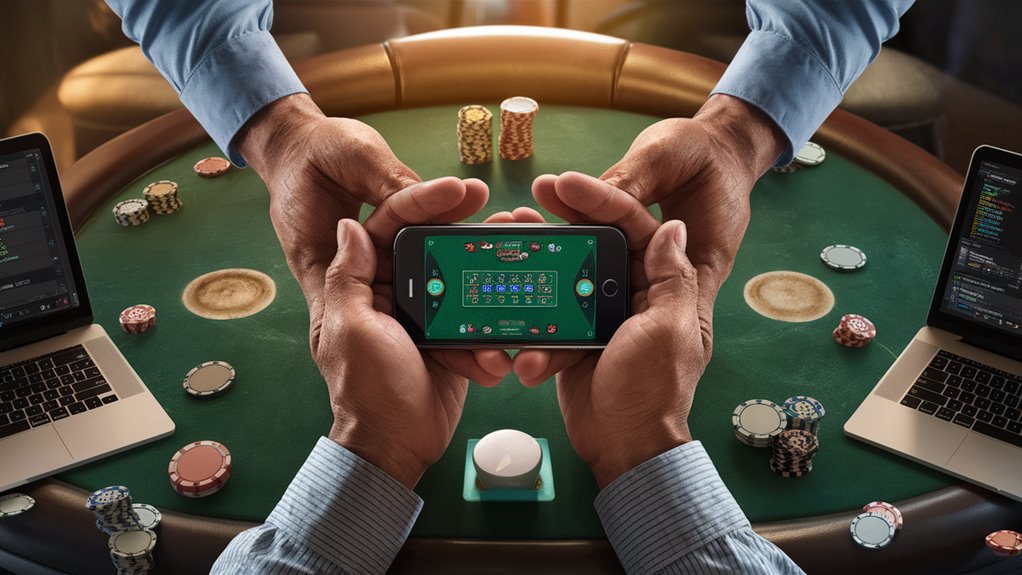
Playing online poker has completely changed how we connect with other players, and it's fascinating to see how these virtual relationships develop.
Think about it: players are building genuine friendships without ever shaking hands or sitting across from each other at a physical table. Through chat boxes and community forums, you're suddenly part of a global network, sharing stories and strategies with people from every corner of the world.
The social dynamics in online poker leagues are pretty unique, you know? It's all about growing together and learning from one another.
You might find yourself helping newcomers understand the basics, or maybe you'll join a study group where everyone shares tips and tricks. There's something really special about facing the same opponents regularly, too. You start developing these friendly rivalries that make the whole experience more exciting and personal.
Sure, online poker relationships are different from what you'd experience at a traditional poker table. You can't pick up on those subtle physical tells or enjoy the back-and-forth banter that happens in person.
But here's the interesting part: these virtual connections open up a whole new world of possibilities. You'll meet players with different styles and backgrounds that you might never encounter at your local card room.
Plus, if you're someone who feels a bit nervous in social situations, online leagues can be perfect. They let you build meaningful connections at your own pace while still being part of the larger poker community.
Future of Online Poker Leagues
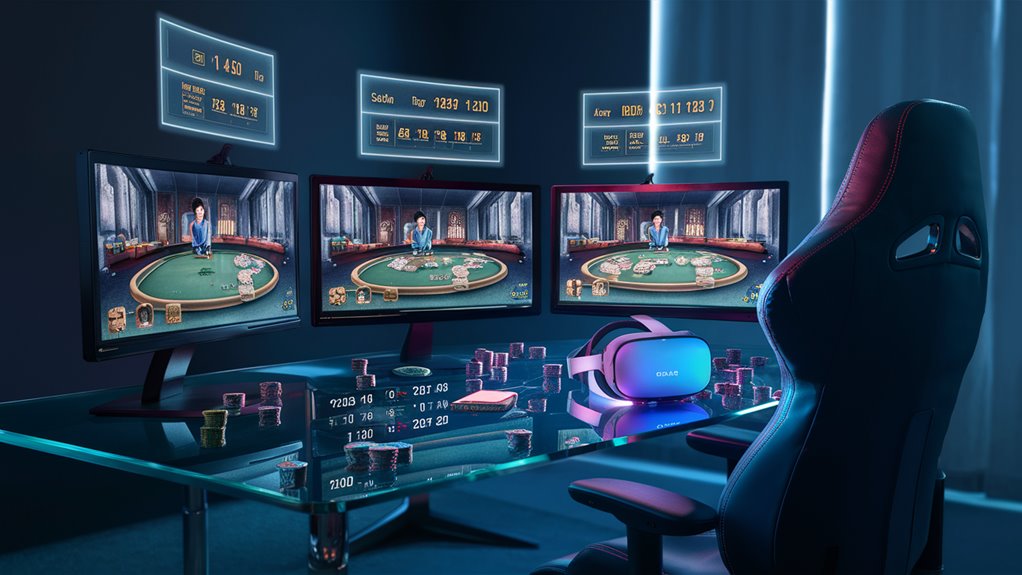
The world of online poker leagues is going through some pretty exciting changes right now. Let's look at three game-changing trends that are completely reshaping how we play poker online.
First up is blockchain technology, and honestly, it's a real game-changer. Think about all those frustrating payment delays and trust issues we've dealt with before.
Well, blockchain is fixing that by making payments lightning-fast and crystal clear. Smart contracts are particularly cool because they'll automatically handle tournament payouts, no more waiting around for your winnings.
Now, here's where it gets really interesting: virtual reality is taking online poker to a whole new level. Imagine sitting at a virtual table where you can actually see and interact with other players, just like you're in a real poker room.
You'll be able to pick up on those subtle tells and body language cues, even in the digital world. Pretty amazing, right?
But wait, there's more. Artificial intelligence is stepping up to make the whole experience better and safer. You know how frustrating it's when you suspect someone's using a bot?
AI is getting really good at catching those cheaters. Plus, and this is really cool, AI tools can analyze your playing style and help you become a better player by studying millions of hands and suggesting smarter moves.
The really exciting part is how these technologies are coming together. Picture playing in a completely fair game where every hand is verifiable, while you're sitting in an incredibly realistic virtual environment, with smart tools helping you improve your game.
That's where online poker leagues are headed, combining serious competition with rock-solid security and some fantastic learning opportunities.
Common Questions
How Do Online Poker Leagues Handle Disputes Between Players During Tournaments?
Let's dive into how online poker leagues handle those tricky player disputes during tournaments. You know how it goes, there's always going to be disagreements when competitive players are involved. Well, these leagues actually have this pretty well figured out.
Tournament directors are like the referees of the online poker world. They're constantly monitoring games in real time, keeping an eye out for any suspicious behavior or potential issues. Think of them as digital poker room managers who are ready to step in whenever players need clarification or have concerns.
When disputes pop up (and trust me, they do), these directors spring into action. They'll pull up detailed hand histories, which are basically like instant replays of every move made during the game. Pretty handy, right? They'll carefully review what happened, consider the rules in play, and look at the situation from all angles.
But here's what really matters: their decisions are final and binding. Just like a referee's call in sports, once the tournament director makes their ruling, that's it. This system helps keep everything fair and running smoothly, preventing any single dispute from derailing an entire tournament.
What Security Measures Protect Players From Collusion in Online Poker Leagues?
Let's talk about how online poker leagues keep things fair and square for everyone. You might be wondering what goes on behind the scenes to prevent cheating and collusion. Well, there's actually quite a bit of sophisticated technology working around the clock to protect players like you.
Think of it as having a virtual security team watching your back. First up, there are these smart algorithms, kind of like digital watchdogs, that constantly scan for anything fishy in betting patterns. You know how you can spot when someone's acting weird at a poker table? These systems do the same thing, just way faster and more accurately.
Now, about those sneaky players who try to create multiple accounts? The leagues have that covered too. They use IP tracking, which is basically like a digital fingerprint checker, making sure nobody's playing from the same location with different accounts. Pretty clever, right?
But wait, there's more. During tournaments, real-time monitoring systems are constantly at work, scanning player interactions. It's like having a super-observant dealer who never misses a trick. If something looks suspicious, these systems immediately raise red flags for the security team to investigate.
Are Winnings From Online Poker Leagues Taxable in Different Countries?
Let's talk about online poker winnings and taxes, because this can get pretty tricky depending on where you live. You know how tax laws can be confusing? Well, they're even more complex when it comes to gambling income.
In the United States, it's pretty straightforward: your poker winnings are fully taxable, and you'll need to report every dollar you earn from those online tournaments. But here's where it gets interesting: if you hop across the pond to Europe, you might find yourself in a completely different situation.
Some European countries take a really relaxed approach to gambling income. Take the UK, for instance, where recreational gamblers don't have to pay taxes on their winnings at all. Pretty sweet deal, right? But wait, there's a catch. If you're playing poker professionally, some countries might view your winnings as business income and tax you accordingly.
The bottom line? Your location matters big time when it comes to paying taxes on those poker wins. Before you start counting your chips, it's worth checking out your local tax laws or chatting with a tax professional who knows the ins and outs of gambling income. Trust me, it's better to know where you stand before the taxman comes knocking.
How Do Time Zones Affect Scheduling and Participation in Global Leagues?
Let's talk about the tricky world of time zones in global gaming leagues. You know how it feels when you're trying to schedule a simple video call with someone overseas? Well, imagine coordinating entire tournaments across multiple continents. The reality is, what's prime gaming time for you might be the middle of the night for your competitors.
Think about it: when you're ready to play at 8 PM in New York, players in London are already heading to bed at 1 AM, while gamers in Tokyo are just starting their workday at 9 AM. This creates some interesting challenges for everyone involved. Sometimes you'll need to adapt to unusual playing hours, maybe jumping into tournaments at 6 AM or staying up until 2 AM to catch that big match.
Tournament organizers often try to find middle ground by rotating schedules or hosting regional qualifiers at convenient local times. But when it comes to those major international events? Well, someone's bound to draw the short straw and play during their off-hours. It's just part of the global gaming experience, and successful players learn to adjust their sleep schedules and practice routines accordingly.
What Percentage of Online Poker League Players Eventually Compete in Live Tournaments?
Let's talk about the journey from online poker leagues to live tournaments. You might be surprised to learn that roughly 15-20% of online players make this exciting transition. Pretty interesting, right?
The path usually starts small. Think local card rooms and weekend tournaments where players can get their feet wet without diving into the deep end. It's kind of like learning to drive in an empty parking lot before hitting the highway.
Now, these numbers aren't set in stone. Some regions see higher conversion rates, while others might be lower, depending on factors like tournament availability and local gambling laws. You know how it goes, location can make a big difference.
What's really cool is how many players start their journey. They might begin with small buy-in online leagues, get comfortable with the virtual felt, then naturally progress to sitting across from actual opponents. The experience is totally different when you can see your competition face to face.
Most successful transitions happen gradually. Players often test the waters with $50 or $100 local tournaments before even thinking about those bigger events you see on TV. It's a smart approach, honestly. Building confidence and experience step by step tends to work better than jumping straight into high-stakes games.






